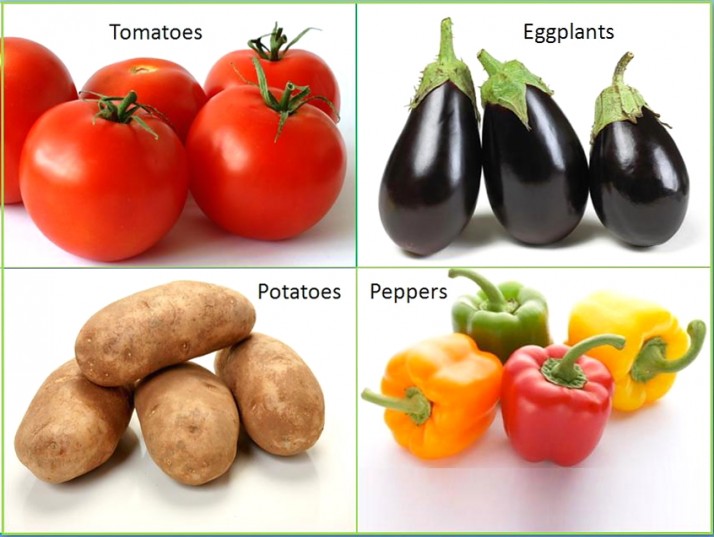Do you suffer from gluten intolerance, mood swings, indigestion, arthritis, or an auto-immune disease? If so, the hidden culprit could be nightshades. The nightshade family includes potatoes, tomatoes, peppers, and eggplants.Other symptoms of nightshade sensitivity are depression, anxiety, constipation, fibromyalgia, osteoporosis, joint pain, headaches, nausea, bloating, flatulence, IBS, anemia, and poor food absorption. Allergies to nightshades are common throughout the western world. Symptoms of nightshade sensitivity often overlap with of gluten and dairy intolerances.
How Can I Avoid Nightshade Foods?
This can be challenging, since they seem to be in everything. I suggest you don’t go crazy. Start simply by limiting your intake of nightshades rather than trying to go 100% nightshade-free. Know your recipes and read labels in prepared foods. Stop buying tomatoes, peppers, potatoes and eggplants. Focus on the foods you CAN eat rather than what you’re missing. You can eat every recipe on this website! Make smart substitutions like mashed cauliflower for mashed potatoes. Avoid obvious nightshade foods like potato chips, pizza, pasta sauce, ratatouille, salsa, hot peppers, and cayenne. You may receive a double benefit: Not only will your intestines begin to heal, you’ll also enjoy better nutrition. That’s because home-cooking is way healthier than fast food and eating out in restaurants.
The more nightshades you consume, the greater the risk of leaky gut.
If you suspect this sensitivity may be your issue, consider removing nightshades from your diet for a period of time, and observe how you feel. Then try re-introducing them to your diet. If your condition gets worse, that’s a pretty good indication that nightshades may not be part of your healthiest lifelong diet. It may take several months for your intestinal wall to repair and for your body to fully respond. The best advice is to listen to your own body. Don’t forget to view all my Nightshade-free recipes. (Yep, they’re all nightshade-free.)
Who should avoid nightshades?
Anyone wishing to optimize digestive health, and people suffering from autoimmune diseases or allergies would be well advised to eliminate or drastically reduce consumption of potatoes, tomatoes, peppers, and eggplants. Your digestion is unique. Since digestion is a highly individual function, some people may be more affected by nightshades than others. Nightshades are toxic to dogs, cats and horses.
This is a summary of three articles by Dr. Loren Cordain, professor and author of “The Paleo Diet”. Find Dr. Cordain’s complete articles here: #1 Potatoes, #2 Tomatoes, #3 Peppers.
What diseases have been linked to nightshades?
There is increasing evidence that gluten intolerance and many autoimmune diseases are linked to a leaky gut, which allows microbes and toxins to enter the blood stream to compromise the immune system. Specific auto-immune diseases that may be affected by nightshades include Arthritis, Type 1 Diabetes, Crohn’s disease, Grave’s disease, Celiac disease, Multiple sclerosis, Hashimoto’s disease, and Lupus.
Nightshade sensitivity appears to be genetic.
Nightshades came from the New World, and these foods were unknown in Europe and Asia until well after the “discovery” of America in 1492. They entered the mainstream North American diet around 1800. Three hundred years is a very short time span in human biological evolution. If you’re of white Anglo-Saxon heritage, nightshades are a very recent addition to your diet, and they’re more likely to cause problems. However if you are Hispanic, your ancestors have been eating nightshades for centuries, so chances are slim you’ll be sensitive.
Nightshades and glutinous grains have a lot in common.
They all contain anti-nutrients, natural compounds which resist digestion and cause intestinal perforation. What are antinutrients? They are natural chemicals in seeds, such as lectins, saponins, enzyme blockers, trypsin, and phytic acid. They may taste slightly bitter and often cause intestinal permeability or poor nutrient absorption. Mother Nature has done her job well, ensuring that seeds pass straight though the body undigested, in order to be planted in the ground. Most grains, nuts, and seeds—including wheat, corn and rice—the world’s primary foods—contain natural antinutrients that impede digestion.
How do Nightshades cause problems?
Dr. Loren Cordain, professor and author of “The Paleo Diet”, says that the anti-nutrients in nightshades can interfere with human digestion causing intestinal permeability, or “leaky gut”. This leaves unprotected holes in the intestinal lining, an open invitation to many of our modern auto-immune diseases.
Nightshades contain two primary toxins: Saponins and Lectins.
Both of these chemicals play a major role in increasing intestinal permeability, laying the groundwork for a variety of modern conditions.
Saponins are natural chemicals in some plants that can impair health by creating holes in the intestinal lining. A perforated intestine is vulnerable to any microbes and toxins that may enter the bloodstream. Foods high in saponins are potato skins and potato chips with the skins. Ripe tomatoes have low levels of toxic saponins. However green tomatoes and “hot house” tomatoes, or those that are harvested before they are ripe, are exceedingly high in these toxins. Peppers are high in saponins, such as Bell peppers, Cayenne pepper, Chipotle, Chili pepper, Paprika, Jalapeno pepper, Pimento, Serrano pepper, Ancho, Habanero, and Tabasco.
Lectins are natural proteins in plants that are cell code breakers. Our cell walls are covered with chemical receptors to protect and ensure entry of only the right compounds. Lectins can crack the codes and trick the cell into doing things it normally would not do. Lectins can bypass our defenses, “getting behind the lines” to travel all over the body. Lectins can penetrate the protective mucus of the small intestine, promoting cell division at the wrong time, and even causing cell death. Lectins can perforate the intestinal wall, or trick the immune system to thinking there’s an intruder, causing an allergic reaction.
Lectins and Saponins act like a Trojan Horse intruder into the intestines, exposing the body to microbes and toxins that would normally be immediately destroyed by a healthy immune system.
Read my article: Are Nightshades Paleo?










